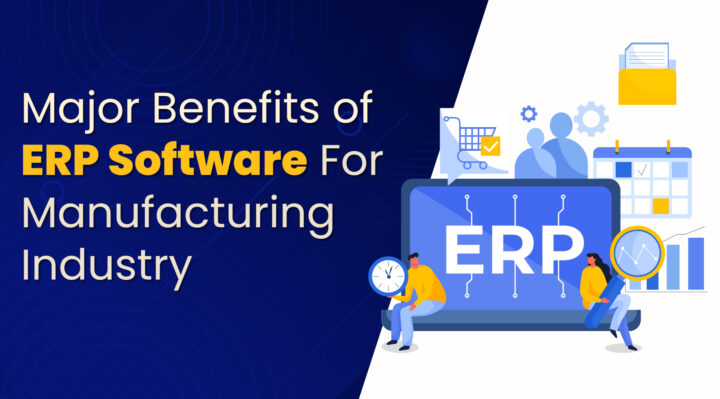In the dynamic landscape of the manufacturing industry, achieving excellence in performance, reducing costs, driving revenue growth, and maximizing productivity is a constant pursuit. ERP (Enterprise Resource Planning) solutions stand as a beacon, capable of revolutionizing operations by streamlining processes, integrating functions, and optimizing efficiency.
The manufacturing sector, renowned for its diversity and operational efficiency, necessitates tools capable of enhancing its multifaceted operations. ERP systems for manufacturing have emerged as pivotal instruments, facilitating the maintenance of centralized databases that amalgamate diverse facets of operational activities.

Once the exclusive domain of global conglomerates, ERP systems have witnessed an unprecedented surge in popularity over recent years, permeating through organizations of varying scales and structures.
Remarkably, according to Finances Online Reviews for Businesses, approximately 35% of the ERP implementations in the past year were spearheaded by companies previously entrenched in legacy systems, underlining the increasing recognition of ERP’s transformative potential across diverse business environments.
This surge in adoption signifies a shift towards modern ERP software development, showcasing the acknowledgment of the need to evolve outdated systems into sophisticated, integrated solutions that cater to the dynamic demands of contemporary industries.
For enterprises seeking to navigate the intricate web of daily operations with finesse and efficacy, a sophisticated ERP system tailored to the unique requirements of the manufacturing industry is indispensable. Different types of ERP software have proliferated, offering a spectrum of functionalities and scalability to cater to the diverse needs of manufacturing organizations:
Cloud-Based Manufacturing ERP Software
This flexible software solution boasts regular updates, comprehensive support, training modules, and customizable options, empowering manufacturers with a dynamic yet encompassing system.
Hybrid ERP
By harnessing both on-premises and cloud-based hosting, manufacturers can seamlessly pivot between distribution models and leverage additional benefits not present in their existing implementations.
On-premise Manufacturing ERP Software
While providing ownership, control, and system support, this solution also demands the management of hardware and system infrastructure, encompassing its own set of responsibilities and costs.
Benefits of ERP Software For the Manufacturing Industry
- Process Automation
ERP systems serve as pivotal tools in revolutionizing operational efficiency by automating standard company procedures within the manufacturing sphere. With a centralized repository housing real-time data, these systems empower end-users across departments to effortlessly navigate and monitor production statistics. This eliminates the need for manual interventions, expediting processes, and fostering a seamless operational landscape.
By leveraging this accessibility and automation, ERP systems catalyze heightened profitability, streamlining workflows, minimizing errors, and enabling rapid responses to market dynamics. The elimination of manual tasks not only enhances precision but also amplifies productivity, laying the groundwork for sustained growth and competitive advantage within the manufacturing industry.
- Cash-flow Management
Integrated ERP solutions serve as robust allies in adeptly managing cash flow within manufacturing enterprises. These systems offer real-time insights into purchasing and planning reports, empowering businesses to vigilantly monitor transactions. By facilitating meticulous record-keeping of inflows and outflows, ERP systems mitigate risks and ensure precise financial documentation.
This real-time visibility not only aids in risk mitigation but also enhances decision-making, enabling proactive measures that optimize cash flow, bolster financial stability, and fortify the company’s fiscal health.
- Customer Relationship Management (CRM)
Deeply integrated within ERP systems, the CRM module intricately monitors interactions with crucial clients, enriching sales strategies, ensuring seamless tracking, and boosting customer satisfaction. This comprehensive functionality obviates the need for standalone CRM solutions, offering a unified platform for managing customer relationships.
The seamless amalgamation of CRM within the ERP system not only streamlines operations but also enhances customer-centric strategies, fostering stronger client relationships and yielding higher satisfaction levels without the complexity of additional software solutions.
- Industrial Internet of Things (IIoT) Enablement
The manufacturing sector experiences a significant transformation as ERP systems adopt IIoT technology. This integration links machinery and systems, providing immediate notifications on maintenance needs and crucial insights into customer usage patterns.
This marks the dawn of predictive maintenance and customer-focused production, revolutionizing how industries operate by leveraging real-time data for proactive maintenance and enhancing customer experiences through personalized production approaches.
- Informed Decision-Making
Open-source ERP systems stand as essential instruments for decision-makers. They provide comprehensive insights into team performance and business cycles, enabling swift and precise decision-making. These systems empower manufacturers to navigate intricate challenges and capitalize on opportunities proactively.
By offering a holistic view of operations and actionable data, open-source ERP platforms aid in informed decision-making, enabling agile responses to dynamic market scenarios and fostering a proactive approach to embracing industry shifts and leveraging potential growth avenues.
- Cost Reduction and Profitability Improvement
In the unceasing pursuit of revenue growth, ERP systems serve as pivotal drivers in the quest for cost optimization. Their role extends beyond mere operational management, enabling organizations to swiftly adapt to market dynamics and pinpoint less profitable sectors. This ability to swiftly identify inefficiencies and recalibrate strategies contributes significantly to operational streamlining, fostering a culture of heightened efficiency.
As a result, these systems pave the way for enhanced profitability by aligning resources, refining processes, and empowering businesses to navigate economic fluctuations with resilience, ensuring sustained growth and competitiveness within the manufacturing landscape.
- Enhanced Business Insights
The streamlining of operations and efficiency optimization facilitated by ERP systems yields tangible outcomes like increased product output and more efficient inventory management. This upsurge in productivity directly influences internal profitability, showcasing the capability of ERP solutions to provide nuanced and accurate data for informed decision-making.
By harmonizing diverse operational facets, these systems not only elevate productivity but also offer comprehensive insights into performance metrics. Such refined data empowers management to make informed choices, leveraging a holistic understanding of operations to drive strategic initiatives, refine processes, and sustain the upward trajectory of profitability within the manufacturing sector.
- Increased Flexibility
In the contemporary landscape, characterized by rapid shifts in consumer demands, ERP-fueled flexible manufacturing emerges as a game-changer. The ability to swiftly adapt and align with market dynamics translates into heightened market share, cost savings, and enhanced operational efficiency.
- Product Quality Improvement
At the core of ERP-driven manufacturing lies the capability to manage production facilities meticulously. These systems offer real-time insights into production line issues, enabling expedited rectification, and ultimately enhancing product quality, a pivotal factor in augmenting sales and market reputation.
- Centralized Data Source
At the heart of operational efficacy lies ERP software, serving as the bedrock by providing a unified repository for essential company data. This centralized reservoir of information acts as the nerve center, enabling seamless access to real-time data across departments. Such accessibility cultivates a culture of data-driven decision-making, empowering organizations to extract actionable insights swiftly and efficiently.
The cohesive nature of this centralized data source fosters a cohesive understanding of business operations, facilitating informed strategies and swift responses to market trends. Ultimately, ERP software emerges as the linchpin for harnessing the power of unified data, empowering businesses to make informed choices and drive sustained growth.
Conclusion
The multifaceted nature of the manufacturing sector underscores the need for agile, efficient, and integrated solutions. Embracing ERP software tailored for manufacturing stands as a pivotal step toward enhancing operational effectiveness and navigating the evolving landscape of modern-day manufacturing. Before implementation, exploring manufacturing software pricing schemes provides a comprehensive understanding of the potential benefits and impacts on the manufacturing industry’s operational landscape.
The multifaceted nature of the manufacturing sector underscores the need for agile, efficient, and integrated solutions. Embracing ERP software tailored for manufacturing stands as a pivotal step toward enhancing operational effectiveness and navigating the evolving landscape of modern-day manufacturing. Before implementation, exploring manufacturing software pricing schemes provides a comprehensive understanding of the potential benefits and impacts on the manufacturing industry’s operational landscape. Evaluating which ERP system is best becomes crucial in aligning the specific needs of the manufacturing business with the functionalities and capabilities offered by various ERP solutions.



